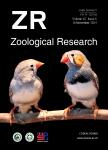Metabolomic-based analysis reveals bile acid-mediated ovarian failure induced by low temperature in zebrafish
作者机构:Key Laboratory of Exploration and Utilization of Aquatic Genetic ResourcesMinistry of EducationCollege of Fisheries and Life SciencesShanghai Ocean UniversityShanghai 201306China Laboratory for Marine Biology and BiotechnologyQingdao National Laboratory for Marine Science and TechnologyQingdaoShandong 266237China International Research Center for Marine BiosciencesMinistry of Science and TechnologyCollege of Fisheries and Life SciencesShanghai Ocean UniversityShanghai 201306China
出 版 物:《Zoological Research》 (动物学研究(英文))
年 卷 期:2024年第45卷第4期
页 面:791-804页
核心收录:
基 金:National Natural Science Foundation of China(32130109) Open Project Fund from Laboratory for Marine Biology and Biotechnology,Qingdao National Laboratory for Marine Science(OF2019NO01)
主 题:old stress Ovarian failure Metabolome Zebrafish
摘 要:As ectotherms, fish are highly sensitive to temperature fluctuations, which can profoundly impact their reproductive cycles. In this study, we investigated the fertility and histological characteristics of zebrafish(Danio rerio) ovaries exposed to a temperature gradient ranging from the thermopreferendum temperature of the species,27℃, to lower temperatures of 22℃, 20℃, and 13℃ over a period of two weeks. Comparative metabolomic(six biological replicates for each temperature) and transcriptomic(four biological replicates for each temperature) analyses were conducted under the four temperature conditions. Results indicated that lower temperatures inhibited oocyte development and differential metabolites were involved in steroid hormone production,antioxidant function, and lipid and protein *** reproductive hormones, increased proteolysis,and lipid degradation significantly impeded oocyte development and egg maturation. Notably, a significant increase in bile acid content was noted in the ovaries of the cold-treated fish, indicating that bile acids play a critical role in ovarian failure. Overall, these findings provide valuable insights into the mechanisms governing the reproductive response of fish to cold stress.



